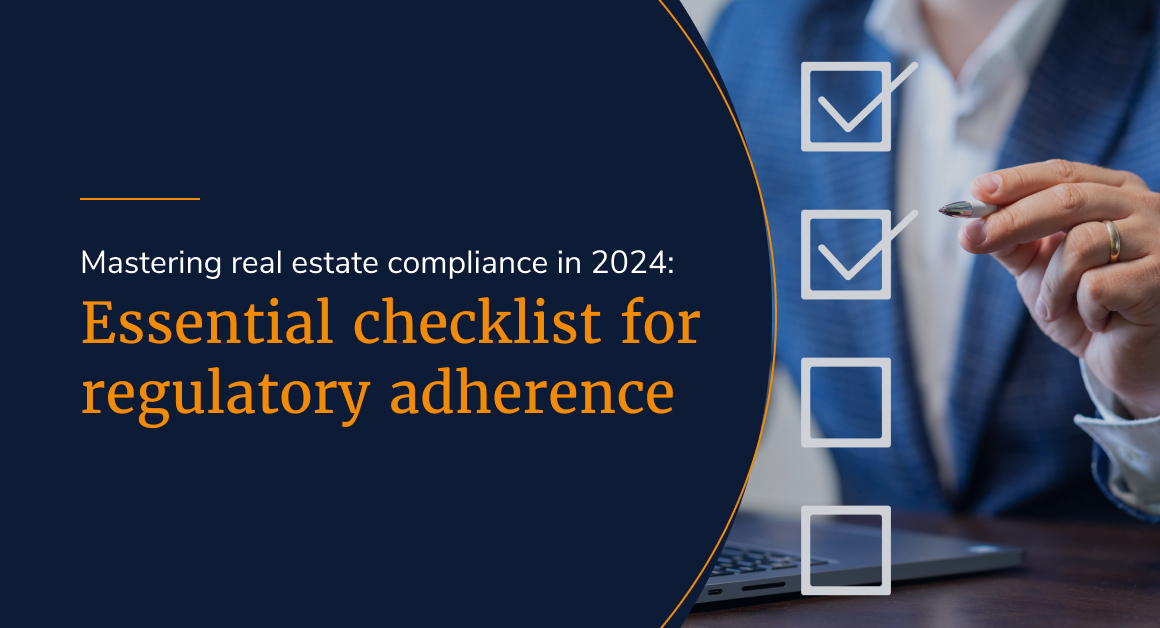In commercial real estate, where billions of dollars change hands each year, compliance serves as the cornerstone for successful general partners. With the global real estate market poised for steady growth, expanding at a compound annual growth rate (CAGR) of 5.2% from 2022 to 2030, the stakes have never been higher.
Verifying compliance across all aspects of a transaction helps protect investments and mitigate legal and financial risks that can derail even the most promising deals. In a market where commercial real estate transactions totaled $348 billion in 2023 alone, the consequences of even seemingly minor compliance lapses can be severe.
Investors need a systematic approach to verifying compliance. That’s where a comprehensive real estate compliance checklist comes in. It provides a roadmap that addresses the key areas at each stage of a transaction. From due diligence to closing, this checklist is a comprehensive tool for ensuring no stone is left unturned.
What is real estate compliance?
Real estate compliance refers to the laws, regulations, and ethical standards that govern every aspect of a real estate transaction.
At its core, compliance in real estate business verifies that all parties involved in a transaction are playing by the rules. This includes fair housing laws, licensing requirements, environmental regulations, financial due diligence standards, and zoning and land use regulations.
For commercial real estate investors, compliance also includes additional regulations, such as the Americans with Disabilities Act (ADA) and the Foreign Investment in Real Property Tax Act (FIRPTA).
The compliance process is ongoing and requires monitoring, updating, and adaptation as laws and regulations change over time.
Key elements of real estate compliance
Now that we’ve covered the importance of real estate compliance, let’s break down its key elements to understand how they contribute to the overall success of a transaction.
Time
Time in real estate compliance refers to the strict deadlines that govern all transactions. Real estate brokers must meet these deadlines for filings, disclosures, inspections, and closing dates to maintain compliance and avoid penalties.
Conduct
Doing business in real estate demands openness, honesty, and the ability to solve challenges. It also means actively resolving conflicts of interest that commissions influence among parties.
Storage
Real estate professionals must maintain accurate records and manage compliance-related documents. These files should be secure, organized, and easily accessible for audits and decision-making.
Completeness
All documentation should be comprehensive, accurate, and up-to-date. Real estate agents are responsible for the integrity of documentation to reduce the potential for delays, disputes, and missed opportunities.
Review
Review involves regularly examining and assessing information for accuracy, completeness, and timeliness. Agents and brokers should address any errors quickly to help prevent risks to the transaction.
Real estate compliance checklist
A complete real estate compliance checklist used by your broker or agent during commercial real estate closings should include these essential elements:
1. Property transaction details
Real estate brokers should gather and document all relevant information about the property and the transaction. This includes:
- Property address
- Buyer and seller information
- Transaction type
- Financial terms
2. Territorial jurisdiction
Identify the local laws as well as state and federal regulations that apply to the property to validate compliance and reduce legal risks.
3. Environmental compliance
Verify that the property meets environmental regulations. Address any issues related to hazardous materials, energy efficiency, or other environmental concerns. For example, if the property is an older industrial building, the broker should ensure that it has undergone inspections for asbestos and lead-based paint. The specific checklist areas should include the following:
- Compliance with environmental regulations
- Absence of hazardous materials
- Proper waste management
- Energy efficiency
4. Property tax review
The broker should verify that the property’s taxes are current and that there are no outstanding tax liens or delinquencies. This may involve:
- Reviewing property tax records and payment due dates
- Contacting the local tax assessor’s office
- Obtaining a tax clearance certificate
- Validating tax assessments
- Determining eligibility for tax exemptions
5. Title deeds and ownership
The real estate broker should review and confirm the accuracy of title deeds and ownership records to verify a clear title. Resolve any title issues, such as a missing deed in the chain of title or an unresolved boundary dispute with a neighboring property owner. The title checklist should include these steps:
- Review title deeds
- Confirmation of ownership
- Check for property liens
6. Property inspection
Review the findings of property inspections to identify any issues or defects that may affect the transaction or require further action. Discuss solutions with the seller to address the issue or agree on a price reduction. Include here:
- Property inspection reports
- Any areas of concern
- Safety standards and compliance
- Need for any repairs or improvements
- Outstanding issues
7. Fair housing compliance
Confirm that all aspects of the transaction align with fair housing laws and regulations, prohibiting discrimination based on race, color, religion, sex, national origin, disability, or familial status. Areas to review are:
- Fair housing laws
- Non-discriminatory practices
- Inclusive marketing
- Equal opportunity for property access
- Staff training on fair housing regulations
8. Zoning and land use
Check that the property’s current and intended use complies with all applicable zoning laws and regulations. The checklist should incorporate:
- Zoning laws
- Property current and intended use
- Variations or exceptions
- Compliance with usage restrictions
- Communication with local zoning authorities if needed
9. Real estate licensing
Confirm that each real estate professional involved in the transaction holds a valid license. This list encompasses:
- Brokers
- Agents
- Property managers
- Any other real estate professionals in the transaction
10. Risk management
Evaluate risk management practices, such as insurance coverage, indemnification agreements, and contingency plans. This reduces potential liabilities and protects everyone involved in the transaction.
11. Financial transactions
Conduct a detailed review of all financial transactions associated with the property. Your checklist should contain:
- Purchase agreements
- Loans documents
- Lease agreements
- Rent roll and payment records
- Financial disclosures
12. Tenant issues
Examine any existing or potential tenant issues in rental properties. Areas include lease agreements, security deposits, and maintenance requests. Validate overall compliance with landlord-tenant laws. For specialized properties like medical office buildings, seek legal counsel to review lease agreements since terms differ among tenants. Assess:
- Tenant records
- Outstanding tenant complaints
- Pending maintenance requests
- Legal violations
13. Real Estate Settlement Procedures Act
Verify that all aspects of the transaction comply with the Real Estate Settlement Procedures Act (RESPA), which governs the settlement process and prohibits certain practices, such as kickbacks and referral fees. The RESPA checklist includes:
- Loan estimate form
- Closing disclosure form
- Compliance with loan origination requirements
- Settlement process guidelines
14. Complete documentation
Real estate agents and brokers should review all required documentation. This includes contracts, disclosures, and forms to confirm that they are accurately completed, signed, and dated by all parties.
15. Compliance report
Prepare and submit a compliance report summarizing the findings of the compliance review. Include any issues identified, corrective actions taken, and recommendations for future improvements.
Most common real estate compliance violations
GPs should be aware of the most common real estate compliance breaches that can create headaches for all parties involved. These missteps, ranging from mishandling trust funds to engaging in unlicensed activity, can have negative outcomes for everyone involved in the transaction.
Trust fund violation
Trust fund violations involve the mishandling or improper use of client funds held in trust accounts, such as earnest money deposits or rental income. According to California’s Department of Real Estate audit findings, a common issue is the lack of separate records for each beneficiary.
Brokers should conduct regular audits of trust account records to ensure regulatory compliance and detect any mishandling of client funds. Establish clear guidelines and procedures for maintaining separate records for each beneficiary to prevent trust fund violations.
Unlicensed activity
Real estate brokers or agents engaging in real estate transactions or services without holding a valid license as required by state law are committing unlicensed activity.
To mitigate risks, GPs should vet and verify the licensing status of all brokers and agents involved before beginning any real estate transactions.
Failure to supervise
If real estate brokers or other responsible parties fail to provide proper oversight and management of licensed real estate agents or employees, they are guilty of failure to supervise.
Brokers should take proactive measures to provide adequate supervision and oversight of all agents or employees within their organization. This may include regular check-ins, performance evaluations, and ongoing training to maintain standards of accountability and compliance.
Misrepresentation of facts
Providing false, misleading, or inaccurate information about a property or transaction to clients or other parties constitutes misrepresentation of facts.
For GPs, implement a due diligence checklist to validate the accuracy of the property information provided to you by the agent and seller.
The bottom line – a compliance checklist is key
GPs should incorporate this compliance checklist into their overall due diligence process to minimize risks. Make it a top priority to closely monitor the transaction and confirm that all parties adhere to these guidelines.
Be aware of the financial and legal risks associated with non-compliance, such as fines, penalties, and legal disputes that can jeopardize the success of the transaction. Regular audits and reviews help identify and address any issues promptly.
Compliance is an ongoing process, and staying up-to-date with changes in laws, regulations, and industry standards can help you adapt to evolving requirements.
When transactions meet deadlines, follow regulatory compliance, and protect the interests of all parties involved, everyone achieves success.










